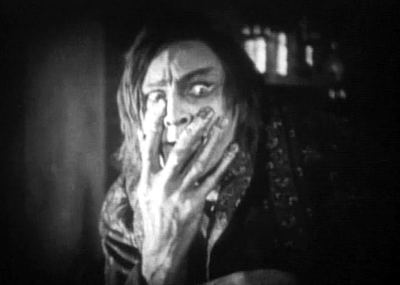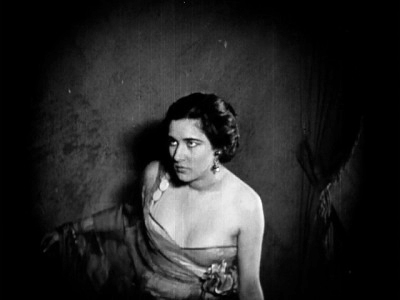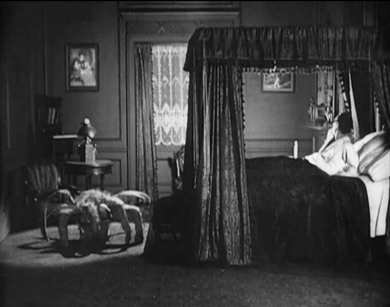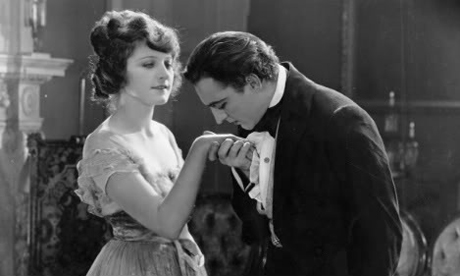|
|
Reviewed by Glenn Erickson
One can't get closer to the roots of modern horror than Robert Louis Stevenson's 1886 novella Strange Case of Dr. Jekyll and Mr. Hyde. Predating modern psychology, Stevenson's notion of a personality split along moral lines played well in Victorian times, as it rationalized the need for society to repress man's baser nature. Freed from moral restraints, the benign Dr. Jekyll becomes a soulless hedonist. He defiles women, tramples children and murders men without guilt. The 'innocent' Jekyll cannot control his alter ego, who eventually takes over.
The book was almost immediately adapted as a London play by Thomas Russell Sullivan, who added a love interest and hyped Jekyll's big transformation scene into a shocking showstopper. The popular stage star Richard Mansfield made Jekyll his signature role. Perhaps it was partially a publicity stunt, but Mansfield's notoriety resulted in his being interviewed about the Jack the Ripper murders. A hundred years later, Armand Assante played Mansfield performing Jekyll & Hyde on stage in a TV movie, Jack the Ripper. Mansfield is seen using special makeup effects to pull off his transformation scenes.

The flashy role was a magnet for flamboyant actors. Eight films on the subject had already been produced when actor John Barrymore, "The Great Profile", starred in the extremely popular 1920 Adolf Zukor version of Dr. Jekyll and Mr. Hyde. Directed by John S. Robertson, this version is based on the Sullivan storyline. Barrymore's performance retains the theatrical excesses that seem dated today, yet are still quite impressive. Using heavy makeup to give his hands a spidery appearance, Barrymore twists and stretches his face into a series of nasty smiles, glaring wide-eyed (even cross-eyed) at the camera. Additional makeup is added across camera cuts, until Barrymore's Hyde is a hunched, straggle-haired fiend, with a horrid, half bald pointed head.
Taken with a proper appreciation of the film's age, Barrymore's interpretation is startling and disturbing. The dull Jekyll tends to stare with a vacant, noble look on his face, while Hyde is a repulsive embodiment of evil. Modern impressions of the film have been affected by many parody versions, and the use of film clips out of context for comic purposes. One of the actor's expressions, with his face stretched out and his eyes staring downward, pops up from time to time in the rubber-face schtick of popular comedians: Danny Kaye, Sid Caesar, Red Skelton, even Dick Van Dyke.
The story is the same as the more familiar later versions by Paramount and MGM, minus Rouben Mamoulian's pre-Code sexuality and the bizarre Salvador Dali dream sequences in Victor Fleming's tame remake. The conventional Dr. Lanyon (Charles Lane) warns Jekyll against pursuing "the wrong kind of science." As in the book, attorney Utterson (J. Malcolm Dunn) drafts the document in which Jekyll bequeaths all of his worldly belongings to Hyde. In the film, Utterson also serves double duty as a rival for the attentions of Millicent, Jekyll's chaste sweetheart. Millicent's hypocritical father Sir George Carewe (Brandon Hurst) goads Jekyll into sampling the seedy Soho nightlife, advising the innocent young doctor to sow his wild oats while he may. Carewe chats up a female guest at his own party, telling her that she "is Paradise for the eyes but Hell for the soul." In the original novella Carewe is a Member of Parliament, has no daughter and is one of Hyde's more mysterious victims.
One story point neglected by all the screen versions is the question of what becomes of Dr. Jekyll's benevolent charity ward. Even before the trouble starts, Jekyll is too busy with his research and his clinic work to properly woo Millicent. As in the other versions, it looks as if the 'indispensible' Jekyll leaves the poor children in his clinic to rot. Another basic inconsistency is the idea that the Dr. Jekyll character is inexperienced in sexual matters. In Victorian London, a doctor working in a clinic for poor people would soon know everything there is to know about human behavior.

Some of the supporting characters make strong impressions. Hyde's elderly, cackling landlady is well played by an unbilled, toothless actress. Pug-faced Louis Wolheim (All Quiet on the Western Front) runs the low-class music hall, where performs the seductive dancer Gina. Jekyll is clearly aroused by her embrace. He turns away and excuses himself, but the flame has been lit. A title clarifies things: "For the first time in his life Jekyll had wakened to a sense of his baser nature."
The Dancer Gina is played by the legendary Nita Naldi, in her first film role. She'd very shortly become silent cinema's "female Valentino" in Blood and Sand. Although Naldi wears a daringly low-cut costume, her character isn't given equal time or billing with the "good" Millicent Carewe. Gina's relationship with the domineering Hyde is barely suggested: we see no more than the frightened look on her face when they're introduced. Later on comes a scene meant to depict the rock bottom of Hyde's vices. He finds Gina in a low dive, compares her to another prostitute in a mirror, and then rejects both for a younger moll brought to him in the opium parlor next door. For 1920 it's a fairly depraved set-up: while Hyde manhandles the women at the bar, a drug addict nearby hallucinates ants crawling over his body.
Eventually Jekyll's transformations into Hyde begin to happen spontaneously, even against his will. One of them is handled with a simple, effective dissolve. The most weird by far employs a surreal effect: pure "evil" is manifested as a ghostly spider creature, which climbs onto Jekyll's bed and merges with this body. The hairy abomination is genuinely disturbing.

As with other stories about evil doppelgängers, Dr. Jekyll moves a mirror into his lab to assure himself that no Hyde characteristics peek through his mild-mannered normal form. He leads a double life and spends all of his energy hiding his ugly secret from his friends and Millicent. Although all believe Jekyll to be a saint, he is of course highly corruptible, and therefore not really an inverted image of Hyde. The morally delinquent Jekyll even says that his intention is to evade responsibility for his actions: "I propose to do it ... to yield to every impulse but leave the soul untouched." After the final act's savage murder the guilty Jekyll cannot face being unmasked. As might be expected, Millicent has been kept in the dark about everything. When Lanyon and Utterson witness a transformation with their own eyes, they lie to Millicent for her own good. The last impression is of the handsome John Barrymore, lying still -- in facial profile, of course.

The Kino Lorber Classics Deluxe Blu-ray of Dr. Jekyll and Mr. Hyde is a good new transfer and encoding of this 94 year-old gem, billed as the first serious American horror film. The primary source is a 35mm negative with a great many fine scratches, digs and minor damage built-in. The image is reasonably sharp and stable, but no digital cleanup appears to have been applied. We're told that five minutes of missing footage have been incorporated back into the film. We see some introductory shots in the Carewe household that appear to come from another source, as well as an interesting flashback to the time of the Borgias, to explain how poison is hidden in a special ring. It is difficult to know exactly which scenes are new, if any. Kino's previous (2004) DVD release carries the same extras. It has a shorter running time, but this 79-minute version may be longer by virtue of a slower, more accurate frame rate. The entire show is given color tinting in keeping with original prints.
The Mont Alto Motion Picture Orchestra performs a full score compiled by Rodney Sauer. The music is a nice fit, and works its way to some impressive melodramatic climaxes.
As the style of inter-titles changes more than once during the presentation, it's a sure bet that multiple sources were used to assemble the movie. Archivist David Shepard's Film Preservation Associates is credited with the first extra, a 1912 James Cruze one-reel version. Considering its brevity, it is very well made: in his Hyde makeup, future director Cruze looks like a crazed ghoul, with vampire-like fangs. In 1920 at least two copycat productions followed Barrymore's film. F.W. Murnau's German Der Januskopf starred Conrad Veidt, and is still considered lost. But Kino offers a 15-minute excerpt from a version starring Sheldon Lewis by one Louis Mayer -- not to be confused with Louis B. Mayer. (Thanks to Ian Whittle for the correction, 1.27.14.)

"The Transformation" is an audio excerpt from 1909 that appears to be a recording of a stage act. Actor Len Spencer quotes passages from Robert Louis Stevenson as part of his dramatic buildup.
The final treat is a Stan Laurel farce from 1925 called Dr. Pyckle and Mr. Pride. Laurel's spoof of Barrymore is very funny; he transforms while his gum-chewing girlfriend looks on, suitably unimpressed. Running loose in the streets, the mirthful "Mr. Pride" pulls off a series of infantile pranks.
Looking into the histories of the cast members, we find that more than a few were personal colleagues of the star. Barrymore apparently encouraged Louis Wolheim to become an actor, telling him that his face was made for the stage. But the story of beautiful Martha Mansfield is a forgotten chapter of silent movie horror. Three years later on the set of The Warrens of Virginia, the actress's dress caught on fire. Mansfield was so badly burned that she died the next day. She was 24 years old.
On a scale of Excellent, Good, Fair, and Poor,
Dr. Jekyll and Mr. Hyde Blu-ray rates:
Movie: Excellent
Video: Good
Sound: Excellent
Supplements: two other silent film interpretations of the story (see above), audio record "The Transformation", Stan Laurel spoof short subject from 1925.
Deaf and Hearing Impaired Friendly?
YES; Subtitles: English
Packaging: Keep case
Reviewed: January 10, 2014
Republished by permission of World Cinema Paradise.

DVD Savant Text © Copyright 2014 Glenn Erickson
See more exclusive reviews on the Savant Main Page.
Reviews on the Savant main site have additional credits information and are often updated and annotated with reader input and graphics.
T'was Ever Thus.
Return to Top of Page
|

